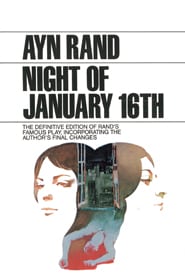

Although Ayn Rand achieved fame as a novelist, her first public success came as a playwright. Night of January 16th, which opened on Broadway in 1935, introduced her to audiences as a bold critic of social conformity.
Though Rand was years away from articulating her own ideal, she had since childhood admired the individual who acts on his own judgments, defying social pressure. Thus the main characters in Night of January 16th are bold egoists who unapologetically seek the world’s rewards and pleasures for themselves.
Notably, however, this play’s heroes don’t embody Rand’s moral philosophy. “I do not think, nor did I think it when I wrote this play, that a swindler is a heroic character or that a respectable banker is a villain,” she writes. “But for the purpose of dramatizing the conflict of independence versus conformity, a criminal — a social outcast — can be an eloquent symbol.”
— Ayn Rand, “Introduction,” Night of January 16th
This play places the audience in the role of juror, with twelve members formally selected to render the verdict in a murder trial. Did Karen Andre kill her lover, the financier Bjorn Faulkner, by throwing him from the roof of his New York penthouse? The proper verdict is not dictated by the factual evidence. It rests on which witnesses audience members find credible.
As the trial progresses through several unpredictable twists and turns, psychological characteristics come to light that reveal each character’s basic attitude toward life. As Rand puts it, “The events feature the confrontation of two extremes, two opposite ways of facing existence: passionate self-assertiveness, self-confidence, ambition, audacity, independence — versus conventionality, servility, envy, hatred, power-lust.”
Faced with such irreconcilable opposites, each audience member must confront the question: Which side do I believe?
[DISTRICT ATTORNEY] FLINT: Can you tell us an instance of Mr. Faulkner’s extravagance?
MAGDA [THE HOUSEKEEPER]: I tell you. He had a platinum gown made for her. Yes, I said platinum. Fine mesh, fine and soft as silk. She wore it on her naked body. He would make a fire in the fireplace and he would heat the dress and then put it on her. It cooled and you could see her body in silver sheen, and it been more decent if she had been naked. And she ask to put it on as hot as she can stand, and if it burned her shameless skin, she laughed like the pagan she is, and he kissed the burn, wild like tiger!
[DEFENSE ATTORNEY] STEVENS: Your Honor! We object! This testimony is irrelevant and only tends to prejudice the jury against Miss Andre!
KAREN: [Very calmly] Let her talk, Stevens.
[She looks at the jury and for a swift moment we see a smile, mischievous, tempting, radiant, a surprise in this cold business woman, revealing an entirely different type of femininity]
Perhaps it may prejudice the jury in my favor.
Karen Andre fell passionately in love with Bjorn Faulkner on the day she applied for work as his stenographer. For the next ten years she helped him carry out his massive financial frauds on a worldwide scale — and was proud to be his mistress.
How would she react when Faulkner suddenly decided to marry Nancy Lee Whitfield, an eligible socialite with a rich father? Would Karen’s jealousy drive her to murder her lover and try to disguise it as a suicide? The reader (and the jury) must decide based on clues from the way she and Faulkner lived their lives, clues that reveal what she was capable of doing in the name of her values.
Although Bjorn Faulkner only appears offstage, his attitude toward life and his bold actions suffuse every scene, conditioning everything the other characters do and say. In the opening dialog, this financial tycoon is described as “young, tall, with an arrogant smile, with kingdoms and nations in the palm of one hand — and a whip in the other.” It is Faulkner’s choices — especially his financial frauds — that set in motion the play’s events, by demanding difficult choices from those around him. From testimony about how Faulkner and Andre lived their lives, the reader (and the jury) must judge which version of events is consistent with the type of people they were.
Larry “Guts” Regan is a handsome gangster who loves Karen Andre. Although he lives outside the law, his sense of honor is on display at every turn. The way he regards Bjorn Faulkner, the way he treats Karen Andre, and the efforts he makes to protect them, all bespeak an attitude toward life that matches that of the two lovers. Regan’s gangland exploits are played for humorous effect during the trial, but at bottom his role is serious and essential to the plot.
— Nancy Lee Faulkner, Night of January 16th by Ayn Rand
Nancy Lee Faulkner is the opposite of Karen Andre in every respect: prim and proper rather than sexual and sensual — contemptuous of material success rather than comfortable in the business world — self-effacing rather than greedy for what the world has to offer. Yet it is Nancy Lee whom the financier Bjorn Faulkner finally decides to marry. Why? As the trial progresses, we see what’s behind the oh-so-proper facade that Nancy Lee offers to the world.
— Nancy Lee Faulkner, Night of January 16th by Ayn Rand
The jury of audience members has only one line in this play: “Guilty!” or “Not Guilty!” depending on the audience-jurors’ vote at each performance. Ayn Rand’s note to the producer explains why this jury might nonetheless be considered a character in the play:
“. . . The two parties opposed in the trial are as radically antagonistic as will be members of any audience, where some will sympathize with the wife, others with the mistress. Either decision will bring the protest of the opposite side; the case is bound to arouse arguments and discussions, for its underlying conflict is the basic conflict of two different types of humanity. It is really the audience who is thus put on trial.”
In Ayn Rand’s view, everyone has a basic attitude toward life — what she called a “sense of life.” A person’s sense of life coalesces during childhood by a complex process of adopting basic views on what’s important in life — values which, if verbalized, would resemble these examples offered by Rand: “It is important to understand things” — “It is important to obey my parents” — “It is important to act on my own” — “It is important to please other people” — “It is important to fight for what I want” — “It is important not to make enemies” — “My life is important” — “Who am I to stick my neck out?”
Each major character in Night of January 16th embodies one of two basic and opposite attitudes toward life: independence vs. conformity. “Night of January 16th,” she wrote, “is not a philosophical, but a sense-of-life play.”
Ayn Rand was a thoroughgoing individualist who held that each person must judge for himself what’s true and desirable. This play dramatizes the attitude of the independent person and contrasts it with the attitude of social conformists, showing how these two basic approaches to life lead to important — even deadly — conflicts.
As a fiction writer, Rand found it interesting to use a criminal outcast to dramatize the conflicting approaches to life. “This, incidentally,” she writes, “is the reason of the profound appeal of the ‘noble crook’ in fiction. He is the symbol of the rebel as such, regardless of the kind of society he rebels against, the symbol — for most people of their vague, undefined, unrealized groping toward a concept, or a shadowy image, of man’s self-esteem.”
As a philosopher, however, Rand clearly understood that criminals are not independent — they are fundamentally dependent on others to create material values for them to loot.
The characters in Night of January 16th are sharply divided in their attitudes toward sexual pleasure. Bjorn Faulkner and Karen Andre revel in their intimacy. In one striking scene, the housekeeper describes the platinum mesh gown in which Faulkner dressed his mistress.
These characters’ antagonists, however, are suspicious, even contemptuous, of such sexual attitudes. In her testimony, Nancy Lee Faulkner says scornfully: “Mr. Flint, there are two kinds of women in this world. And my kind is never jealous of . . . the other.”
These contrasting attitudes toward sexuality are a product of and help define the characters’ fundamental attitudes toward life. As one of the heroes of Atlas Shrugged later puts it, “a man’s sexual choice is the result and the sum of his fundamental convictions. Tell me what a man finds sexually attractive and I will tell you his entire philosophy of life. Show me the woman he sleeps with and I will tell you his valuation of himself.”
Rand called Night of January 16th an instance of “Romantic Symbolism” whose events are not to be taken literally. “I do not think, nor did I think it when I wrote this play, that a swindler is a heroic character or that a respectable banker is a villain. But for the purpose of dramatizing the conflict of independence versus conformity, a criminal — a social outcast — can be an eloquent symbol,” she writes.
“The original title of this play was Penthouse Legend. This is still its best title; it gives some indication of the play’s nonrealistic, symbolic nature. But it was changed twice, first to Woman on Trial, then to Night of January 16th. . . . Night of January 16th is an empty, meaningless title. It was, however, the least offensive one of those suggested to me at the time. I could not change it later: the play had become too famous.”
Night of January 16th was written while Rand was still in her twenties, before she had developed the philosophy of rational self-interest that animated her later novels. Yet in this play, Rand’s fundamental values are at work.
“The motive of my writing has always been the presentation of an ideal man,” Rand said. “I did not regard Bjorn Faulkner as an ideal. But I was not ready to attempt the portrait of an ideal man; his first appearance in my writing is Howard Roark in The Fountainhead, followed by the heroes of Atlas Shrugged.What I was ready to write about was a woman’s feeling for her ideal man, and this I did in the person of Karen Andre.”